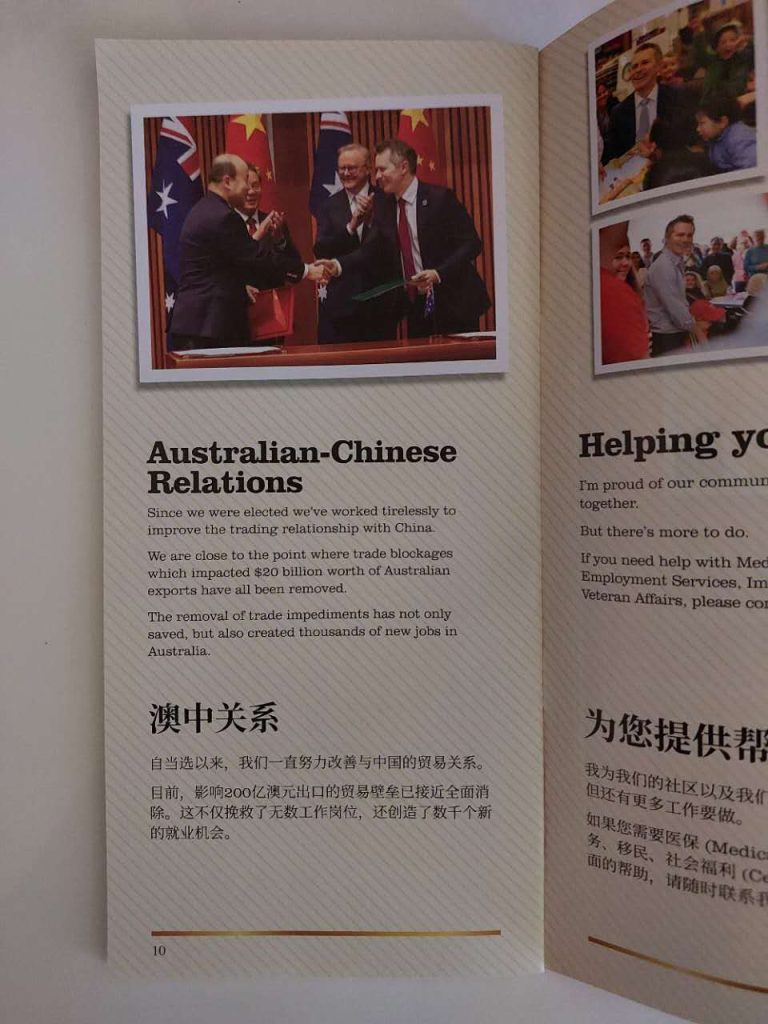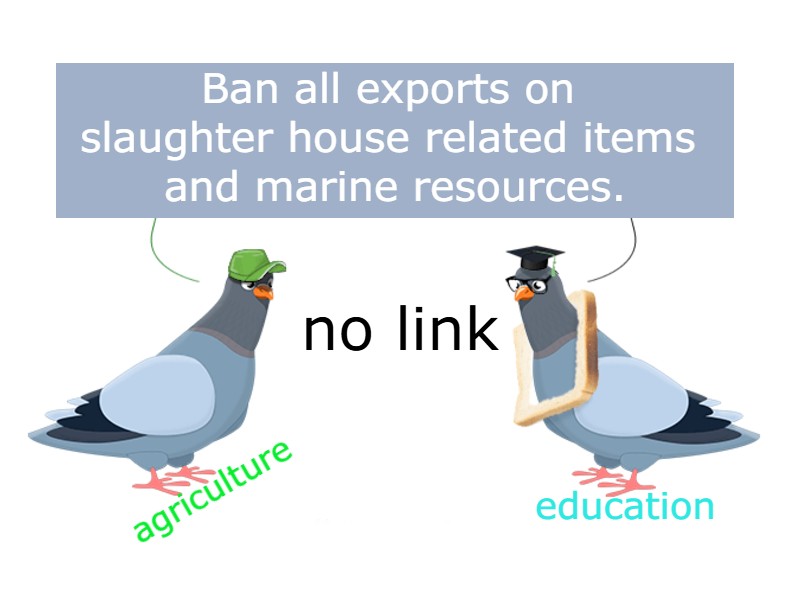Dear Minster Clare,
I am writing to express my concerns regarding the recent announcement you made during the Chinese New Year celebration event, where you indicated that the removal of trade blockages on Australian agricultural exports, such as beef, lamb, barley, and lobsters, would likely lead to the lifting of restrictions on Australian education exports to China. While I acknowledge the economic benefits of resolving trade disputes, I strongly disagree with the approach of linking agricultural exports to the future of Australia’s education sector.

Education is a cornerstone of societal progress and individual growth. For students, particularly those from China and other Asian countries, the decision to study abroad is deeply tied to the quality of education offered. These students and their families view education as a transformative tool—a means to secure a prosperous future. As such, they prioritize high-quality educational institutions over mediocre ones. If Australia wishes to remain a competitive destination for international students, our focus must remain squarely on delivering world-class education, not on leveraging trade deals in unrelated sectors. To put it in simple example, a good mathematics teacher in China never worries about shortage of students, only the bad one do. The good teacher’s students are always packed. Only by word of mouth, more and more students queue to be taught by this good teacher.
The appeal of Australian education extends beyond academics. It encompasses the entire experience—our pristine environment, welcoming communities, and high quality of life. The clear blue skies, beautiful beaches, and friendly atmosphere are integral to the “education package” we offer. However, the expansion of animal agriculture and marine resource exports, which have significant environmental impacts, threatens these very attributes. The degradation of our natural environment, including air and water quality, undermines the appeal of Australia as a study destination.
Moreover, the negative environmental impacts of animal agriculture and marine resource extraction are well-documented. These industries contribute to climate change, deforestation, and biodiversity loss, which in turn harm Australia’s global reputation as a clean and sustainable nation. Instead of prioritizing these environmentally damaging exports, the government should focus on promoting high-tech industries, service-oriented sectors, and other sustainable products that align with global trends toward environmental responsibility.
I urge you to reconsider the approach of tying education policy to agricultural trade outcomes. The future of Australia’s education sector should be determined by its ability to deliver excellence, innovation, and sustainability—not by short-term trade gains in unrelated industries. By focusing on improving the quality of education and protecting our environment, Australia can continue to attract international students and maintain its reputation as a world-class education provider.
Thank you for considering my perspective. I would welcome the opportunity to discuss this matter further and to explore ways in which we can ensure a sustainable and prosperous future for both Australia’s education sector and its environment.
Yours sincerely,

On 15 February, Based on the feed back received from international students, a follow up email was send to the minister:
Dear Minister Clare,
I hope this email finds you well. I am writing to follow up on the email below. I sent a few days ago regarding the importance of maintaining the quality and appeal of Australia’s education sector. Since sending the letter, I have received valuable feedback from international students, which I believe is crucial to share with you.
The rising cost of accommodation has emerged as a significant barrier influencing their decision to study in Australia. Many students expressed concerns about the affordability of housing, which is adding considerable financial pressure and diminishing the overall attractiveness of Australia as a study destination. This issue, which has been exacerbated since the COVID-19 pandemic, requires urgent attention to ensure Australia remains a competitive and welcoming place for international students.

In light of this feedback, I would like to offer the following recommendations for your consideration:
-Address the Rising Cost of Living and Accommodation:
- Urge all levels of government to implement effective measures to reduce the cost of living, particularly housing, for international students.
- Encourage universities to develop and promote shared accommodation programs. Such initiatives could provide affordable housing options for students while offering local residents an opportunity to earn extra income. However, it is essential for the government to address potential challenges related to these arrangements, such as security, cultural differences, and legal frameworks, to ensure a positive experience for both students and hosts.
–Enhance the Quality of Education:
Continue to develop and deliver high-end education to both Australian and international students. Specifically, focus on areas such as:
-Management skills across all industries and in all levels.
-Coordination skills between government and private sectors.
-Global commercialization of Australian innovated products and services.

By offering cutting-edge education that aligns with global trends and demands, Australia can further solidify its reputation as a world-class education provider.
I believe that addressing the accommodation crisis and continuing to invest in the quality of education will not only benefit international students but also strengthen Australia’s position as a leading destination for global education. These steps will ensure that Australia remains an attractive and sustainable choice for students worldwide.
Thank you for your attention to this matter. I would be happy to discuss these recommendations further or provide additional insights to support your efforts in enhancing Australia’s education sector.
Yours sincerely,
The editor of veganvv.com
key member of New Auzzie Draft Plan Team

Reply received from Department of education
On 6th March 2025, the Arthur received email reply form department of education. The email acknowledges the importance of maintaining the quality and appeal of Australian education, particularly for international students. The Australian Government is committed to improving the system to benefit all students and the broader sector. Key concerns, such as housing shortages, rental pressures, and cost-of-living issues, are being addressed, with a focus on providing safe and affordable student accommodation. The government is collaborating with universities, accommodation providers, and various levels of government to develop solutions. While the cost of accommodation is managed by providers, the government offers resources like the Study Australia website and a living costs calculator to assist students. Additionally, the Department of Education has released a guide to help education providers support international students with accommodation needs. The email concludes by thanking the sender for their interest in Australia’s international education sector.
The reply email itself:
Dear receiver
Thank you for your email of 15 February 2025 to the Hon Jason Clare MP, Minister for Education,
about the importance of maintaining the quality and appeal of Australian education. The Minister
has asked me to reply on his behalf.
The international education sector is important to Australia. The Australian Government is
committed to providing a better and fairer system that supports all students and the broader sector
to benefit from quality international education.
Housing shortages, domestic rental pressures and other cost of living considerations are causing
significant concerns across Australia. The provision of safe and affordable student housing is central
to the successful delivery of higher education and a positive student experience. Increasing access to
accommodation for both domestic and international students studying in Australia is a priority for
the Australian Government.
Government is engaging with universities, accommodation providers, and state, territory, and local
governments to develop accommodation models to alleviate student accommodation supply issues.
The cost of student accommodation, however, is a matter for student accommodation providers.
The Government provides information about accommodation and support available to international
students on the Study Australia website (www.studyaustralia.gov.au/en/life-inaustralia/
accommodation), including a living costs calculator (www.studyaustralia.gov.au/en/life-inaustralia/
living-and-education-costs).
The Department of Education has recently released a guide on its website that is designed for
education providers to support international students with their accommodation needs (refer to
www.education.gov.au/international-education-engagement/resources/guide-supportinginternational-
students-accommodation).
Thank you for your interest in Australia’s international education sector. I trust this information is of
assistance.
Yours sincerely
Georgina Harrison
A/g Assistant Secretary
International Division
On 21st March, the Author gave the feedback on upcoming Federal election. Read on https://veganvv.com/ourvision/australian-sky-is-not-for-sale/
“Concerns regarding the link between agricultural exports“ was emailed to The Hon Jason Clark MP, Minister of Education on 7th February 2025 and is published on veganvv.com. the same day.




